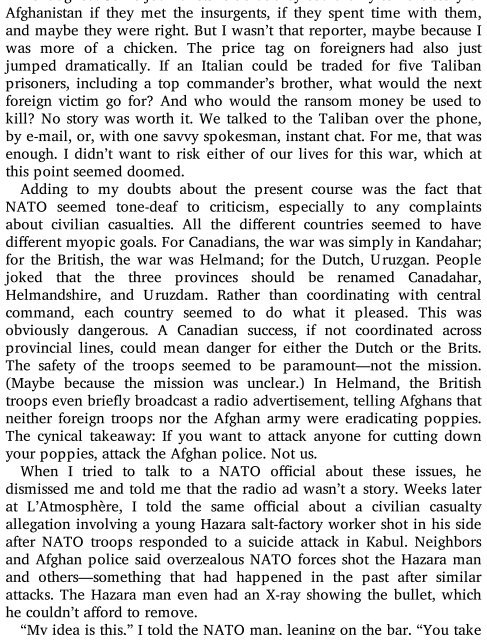the_taliban_shuffle_-_kim_barker
the_taliban_shuffle_-_kim_barker
the_taliban_shuffle_-_kim_barker
Create successful ePaper yourself
Turn your PDF publications into a flip-book with our unique Google optimized e-Paper software.
He laughed. Some journalists felt that <strong>the</strong>y could only tell <strong>the</strong> story of<br />
Afghanistan if <strong>the</strong>y met <strong>the</strong> insurgents, if <strong>the</strong>y spent time with <strong>the</strong>m,<br />
and maybe <strong>the</strong>y were right. But I wasn’t that reporter, maybe because I<br />
was more of a chicken. The price tag on foreigners had also just<br />
jumped dramatically. If an Italian could be traded for ve Taliban<br />
prisoners, including a top commander’s bro<strong>the</strong>r, what would <strong>the</strong> next<br />
foreign victim go for? And who would <strong>the</strong> ransom money be used to<br />
kill? No story was worth it. We talked to <strong>the</strong> Taliban over <strong>the</strong> phone,<br />
by e-mail, or, with one savvy spokesman, instant chat. For me, that was<br />
enough. I didn’t want to risk ei<strong>the</strong>r of our lives for this war, which at<br />
this point seemed doomed.<br />
Adding to my doubts about <strong>the</strong> present course was <strong>the</strong> fact that<br />
NATO seemed tone-deaf to criticism, especially to any complaints<br />
about civilian casualties. All <strong>the</strong> dierent countries seemed to have<br />
dierent myopic goals. For Canadians, <strong>the</strong> war was simply in Kandahar;<br />
for <strong>the</strong> British, <strong>the</strong> war was Helmand; for <strong>the</strong> Dutch, Uruzgan. People<br />
joked that <strong>the</strong> three provinces should be renamed Canadahar,<br />
Helmandshire, and Uruzdam. Ra<strong>the</strong>r than coordinating with central<br />
command, each country seemed to do what it pleased. This was<br />
obviously dangerous. A Canadian success, if not coordinated across<br />
provincial lines, could mean danger for ei<strong>the</strong>r <strong>the</strong> Dutch or <strong>the</strong> Brits.<br />
The safety of <strong>the</strong> troops seemed to be paramount—not <strong>the</strong> mission.<br />
(Maybe because <strong>the</strong> mission was unclear.) In Helmand, <strong>the</strong> British<br />
troops even briey broadcast a radio advertisement, telling Afghans that<br />
nei<strong>the</strong>r foreign troops nor <strong>the</strong> Afghan army were eradicating poppies.<br />
The cynical takeaway: If you want to attack anyone for cutting down<br />
your poppies, attack <strong>the</strong> Afghan police. Not us.<br />
When I tried to talk to a NATO ocial about <strong>the</strong>se issues, he<br />
dismissed me and told me that <strong>the</strong> radio ad wasn’t a story. Weeks later<br />
at L’Atmosphère, I told <strong>the</strong> same ocial about a civilian casualty<br />
allegation involving a young Hazara salt-factory worker shot in his side<br />
after NATO troops responded to a suicide attack in Kabul. Neighbors<br />
and Afghan police said overzealous NATO forces shot <strong>the</strong> Hazara man<br />
and o<strong>the</strong>rs—something that had happened in <strong>the</strong> past after similar<br />
attacks. The Hazara man even had an X-ray showing <strong>the</strong> bullet, which<br />
he couldn’t afford to remove.<br />
“My idea is this,” I told <strong>the</strong> NATO man, leaning on <strong>the</strong> bar. “You take



